Go to the end. This creepy guy was fired!
By Lucy Komisar
May 10, 2021
It’s always quite amazing when pseudo-legitimate journalists write Russophobic stories insisting that their evidence-free fabrications are true. The latest: Nick Cohen, a Guardian contributor, has published a full-of-falsehoods commentary on a book written by Catherine Belton, a longtime Russophobic and admitted-in-court fabricating journalist.
I will focus just on the William Browder/Magnitsky hoax that I have spent years dissecting.
Cohen says: “I sat through a libel case arising from the death of Sergei Magnitsky in a foul Moscow prison.” It was a libel case by a Russian who Browder had accused of complicity in Magnitsky’s death.
So, this is all about Belton regurgitating Browder’s “the Russians killed Magnitsky because he targeted them for a $230mil theft from the Russian Treasury.” Browder got the U.S. and the European Parliament to target individuals he claimed were guilty of the theft. No evidence, actually contradictory evidence, but so what!
Cohen writes, “One official, Pavel Karpov, sued Browder for libel in London. Browder won, but Karpov stayed in Moscow and refused to pay Browder’s costs of £600,000. In other words, Russia, an actively hostile foreign power, appeared able to use the English legal system to impose the punishment of a huge fine on one of its most effective critics.”
No Mr. Cohen, that is a lie. Browder did not win. The judge decided that Karpov, living in Moscow, did not have a reputation in London to defend. So, he dismissed the case. But he said if Browder continued the fake charges, he might revisit the case. Here is the judge’s decision. Though you “sat through the libel case,” you apparently never bothered to read the decision.
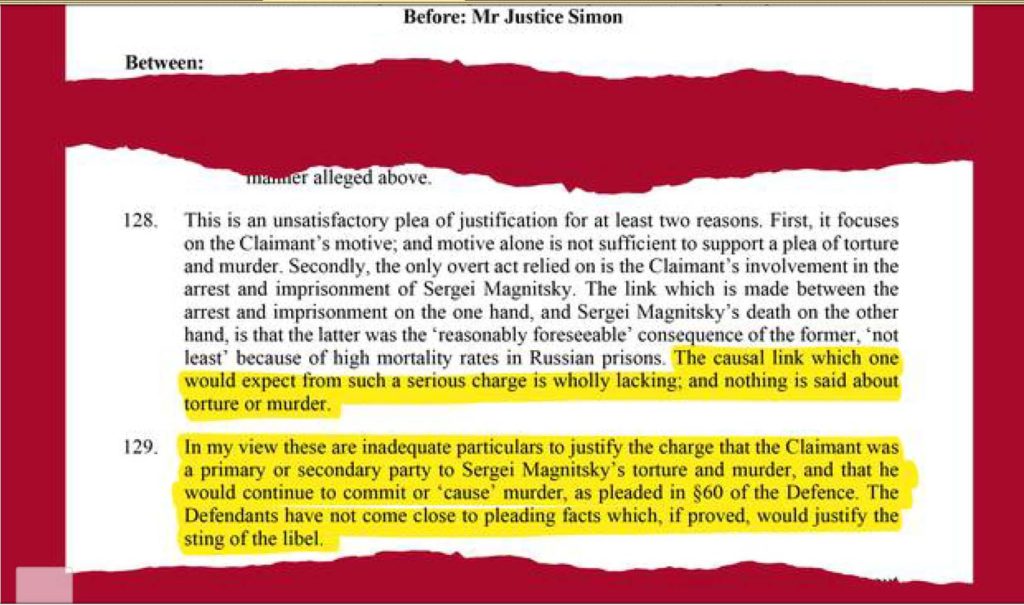
The Guardian wrote a distorted story at the time, with reporter Lisa O’Carroll apparently taking stenography from Browder instead of actually reading the decision. Maybe that’s where you got your misinformation. Since apparently neither of you bothered to read the decision.
You wrote about Magnitsky that, “he showed how former Russian officials and gangsters (a distinction without a difference if ever there was one) stole about $230m from the Russian taxpayer.” No, Mr. Cohen, Browder and his accountant Magnitsky stole the money. Here is the evidence.
The tax refund fraud was a scam that some crooked Russian and Western entrepreneurs had been operating for a few years. There were “professionals” who specialized in it.
One of them, Moscow lawyer Andrey Pavlov, told me, in several hours-long interviews in New York, that he was approached by Viktor Markelov, a convicted felon, who proposed to hire him. Markelov wanted him to obtain a court order based on an invented liability for the Hermitage companies, which would then lead to a claim for a tax refund. (“You didn’t comply with a contract, we lost money, you owe us $1 billion,” which was Hermitage’s entire 2006 profits.)
Browder’s shells didn’t defend the cases and supposedly paid out $1 billion, their entire 2006 profits. Though no one has ever traced that cash. Next step would be to request a refund on taxes paid the Russian Treasury, $230 million. It was their total tax bill, because the payout to the “claimants” was the total profits. Pavlov said the refund application would require detailed information from the companies’ books for the year, which he said pointed to inside involvement.
Of course, it was a fake. Markelov went to prison for managing the “tax refund fraud.” At his interrogation, Markelov talked about the role of Pavlov and also recalled getting documents from a man he knew only as Sergei Leonidovich, (as in Sergei Leonidovich Magnitsky), who was the agent of the unnamed client.
Transferring the Browder shell companies
Browder didn’t challenge the suits. Browder claimed he didn’t know anything about the scam, that his companies had been stolen during the period of collusive lawsuits. Browder‘s complaint says that the true owners of the companies Mahaon, Parfenion, and Riland, learned about these lawsuits by pure chance, and long after the fact.
But the Hermitage companies received legal letters about the lawsuits leading to transfer of ownership in July, the time of the legal actions. The notices went to the companies‘ legal addresses, from which Firestone Duncan, specifically Magnitsky, who monitored the mailboxes, got them. Exhibits to prove Hermitage got the legal notices in July 2007 were filed in U.S. federal court.
Later Browder would say that the officers who searched the offices had taken documents and used them to re-register the firms. However, that is not possible under Russian law. Police, government authorities or others with documents cannot do it. Registered owners must appear in person at the official company registration office or they must request a change of ownership though powers of attorney.
That’s what happened. Powers of attorney were provided by Browder‘s Cyprus shells to Oktai Gasanov, cited by Markelov as his collaborator. Here‘s the power of attorney (translation) from Browder‘s Kone Holdings. Browder claims the powers of attorney are forgeries, but Yianna Alexandrou, employed at the Cyprus company formation agent that set up Browder’s shells, swore in a deposition in U.S. federal court that she recognized her signature.
Then the three Browder shell companies were sold to a new figurehead owner. On this July 31, 2007 sale agreement, see the reference to Glendora, a Browder shell company in Cyprus which was the owner of the Kalmykia shell Parfenion. (It’s called layering, a classic offshore tactic: one shell owns another shell.)
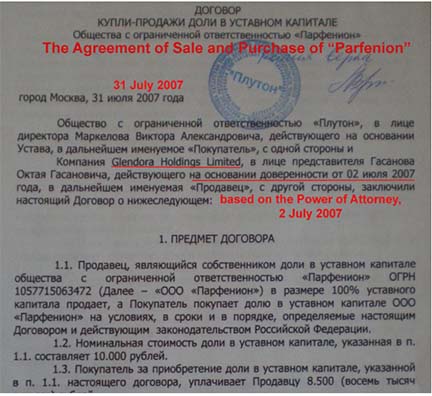
Here is a photo of the bill of sale of Parfenion, one of the shell companies involved in the tax refund fraud. It says Parfenion in English in big red letters. Glendora in English is underlined.
Pluton LLC, represented by Viktor Alexandrovich Markelov, is the buyer. Glendora Holdings Limited, represented by Oktai Gasanovich Gasanov, is the seller. Glendora was Browder‘s Cyprus shell company, owner of his Russian shell Parfenion. In his interrogation, Markelov says Gasanov was his collaborator in the tax refund scheme.
Reregistration of the shell companies
The companies were, according to Magnitsky, not officially re-registered till September. Magnitsky, in June 2008 testimony, says that after “rulings dated 3 and 7 September 2007 by the Arbitration Court of Saint-Petersburg and Leningrad Region” the companies were “were re-registered on 11 September 2007 and 20 September 2007 under new legal addresses in Moscow.” The rulings related to the collusive lawsuits. If that is true, the companies till then would have been registered as owned by Glendora, with their old addresses.
But Glendora is prominent in the July bill of sale. So, why wasn’t the company re-registered for five or six weeks? Did the old (Browder) owners want to keep control, along with the old mailing address?
Magnitsky testified that he received the lawsuit notifications only on October 16, which conflicts with the July date on the Parfenion notification receipt, sent to an address he confirms is correct. He didn‘t explain why mail was apparently not picked up for months.
Browder ignores the lawsuits
Pavlov told me, “In October the whole Browder team knew about these claims and didn‘t appeal the decision [allowing the take-over of his companies] which had been granted.” That October 16 notice said there would be a hearing October 22. Hermitage sent no lawyer to the hearing. Pavlov said, “They did nothing till the money was paid out of the budget [the Russian Treasury]” at the end of December.
All this points to Browder organizing the tax refund fraud along with Magnitsky. It means Browder is the guilty one, the tax refund fraud crook! How to cover that up! Browder refuses to talk to me so I can’t ask him about it.
Browder put Pavlov on his Magnitsky list in 2017, four years after the initial list and just weeks after I ran a story quoting Pavlov about the scam. It was revenge and to prevent him from traveling to the U.S., where he often went to see clients, so he could not talk to other reporters.
You wrote: “His friend and boss at Hermitage, Bill Browder, began a successful global campaign to freeze the western holdings of corrupt Russians.”
No, that was the William Browder Protection Act. Nothing to do with poor Magnitsky who Browder left languishing in prison, because he refused to pay his back taxes. There was zero evidence of any corrupt Russians involved in the $230mil fraud. Or can you provide it? (Thought not.)
Will you deal with these issues? No, you will not. You will ignore this, because you can’t defend your lies. So sad how low journalism, especially at The Guardian, has fallen.
And the same day, here is Nick Cohen’s measured response to this article!
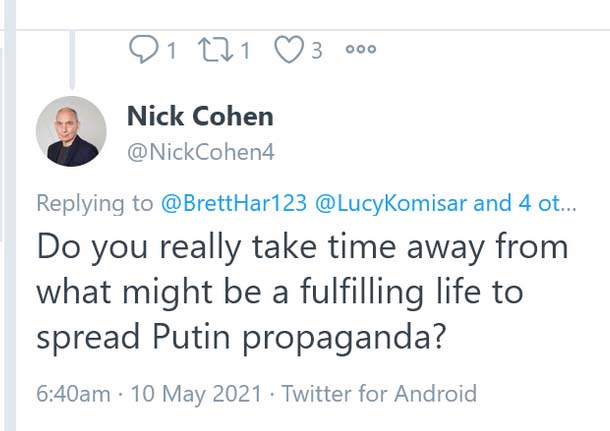
My response to his tweet:
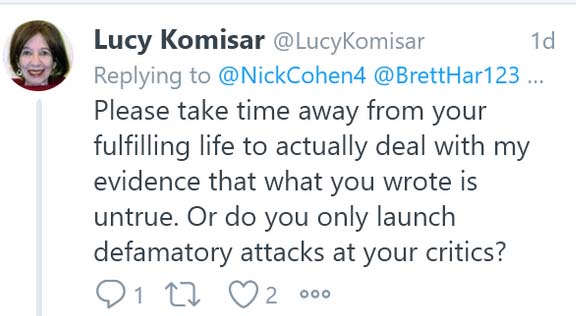
By the way, speaking of defamation, Nick Cohen wants you to believe he knows all about it, from the victim’s side. But consider this: Iraqi billionaire Nadhmi Auchi sued The Guardian and The Observer for libel over articles published about him beginning in 2003. In a 2008 settlement, Auchi won the removal of the articles from their websites. The Guardian admitted the articles had “significant inaccuracies.”
Nick Cohen, a writer for The Observer, then wrote a book, “You Can’t Read This Book: Censorship in an Age of Freedom.” But he didn’t discuss the Auchi case, which reflected badly on his bosses. Self-censorship in the Age of Freedom?
The creepy guy is fired!
Stop the presses! Sexual harasser Nick Cohen forced to resign from The Guardian (excerpts from NYTimes May 30, 2023, by Jane Bradley @jane_bradley, freelance investigative reporter in the UK)
A prominent left-wing columnist, Nick Cohen, resigned from Guardian News & Media, following years of unwanted sexual advances and groping of female journalists. Lucy Siegle [@lucysiegle] is one of multiple women to accuse the British columnist Nick Cohen of unwanted sexual advances and groping. In 2018, she reported Mr. Cohen to The Guardian for groping her in the newsroom, but nothing had happened.
Mr. Cohen spent two decades as a columnist for The Observer, The Guardian’s Sunday sister paper. He won a prestigious award for writing about right-wing politics in the run-up to Brexit. His book “What’s Left” was shortlisted for the Orwell Prize, Britain’s top political journalism award. Inside the newsroom, he was seen as influential, colleagues said, someone who could help your career.
His resignation in January cited “health grounds.” Secretly, the newspaper group paid him a financial settlement for quitting and agreed to confidentiality, according to three colleagues and an editor with whom Mr. Cohen spoke.
Seven women told The New York Times that Mr. Cohen had groped them or made other unwanted sexual advances over nearly two decades. Four insisted on anonymity, fearing professional repercussions. In each case, The Times reviewed documents or otherwise corroborated their accounts.
Ms. Siegle recounted Mr. Cohen grabbing her bottom in the newsroom around 2001. Five other women described similar encounters at pubs from 2008 to 2015. One said Mr. Cohen had pressed his erection against her thigh and kissed her uninvited when they met to discuss her career. A seventh said Mr. Cohen had repeatedly offered to send her explicit photographs in 2018 while she worked as an unpaid copy editor for him.
Mr. Cohen’s reputation was widely known in the newsroom, according to 10 former colleagues, both male and female. One former colleague said she and other female journalists had used a different entrance to a pub to avoid being groped by him. Another woman said she had avoided the bar downstairs from the newsroom after Mr. Cohen grabbed her knee during work drinks.
“There is so much sexism in a lot of British newspapers, and it seems, unfortunately, that many women believed sexual harassment was something you just had to put up with,” said Heather Brooke, an investigative journalist who told The Times that Mr. Cohen had groped her at an awards ceremony in 2008, before she had a high profile.
Guardian News & Media did investigate Mr. Cohen, but only after Ms. Siegle wrote on Twitter in 2021 about her experience.
So great when these scum are taken down! But shouldn’t The Guardian now look into immoral Cohen’s fake Browder stories? Not when The Guardian features master Russophobe Luke Harding! Covering up a reporter being nasty to women is one thing. Lying about Russia is quite okay!
And another lying party heard from! Here is Catherine Belton’s twisted praise of Cohen who supported her in a suit where she and her publisher had to admit that she invented, with no evidence, what she wrote about the Russians who sued her! She doesn’t mention that she lost the case, because as a journalist she is a fake. Also, BTW, a stenographer for Bill Browder. Well, the two dishonest writers are made for each other.
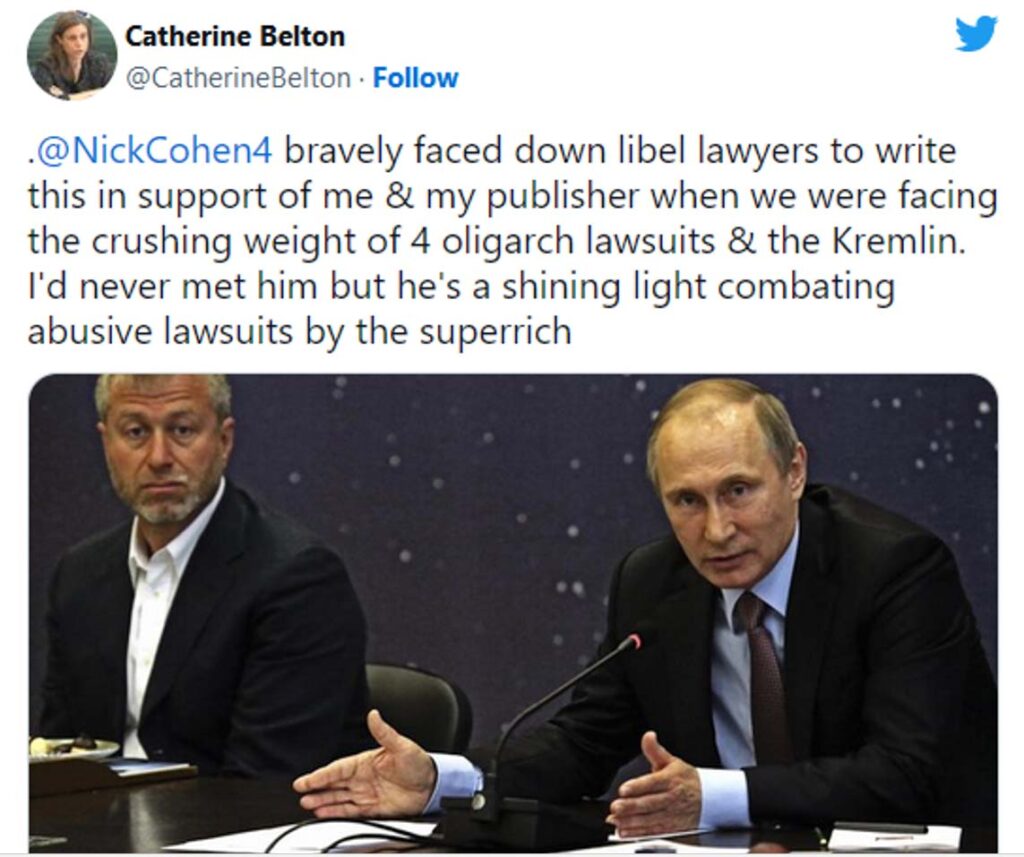
And truly disgusting that a collection of self described free press organizations supported Belton without investigating the evidence, later admitted, that she made up what she was sued for. Did they walk it back? No correction to that post.
I wrote the group, the European Center for Press and Media Freedom: “You put out this post of organizations supporting Catherine Belton in the suit against her by some Russians saying she had lied about them in a book she wrote. Later she and her publisher admitted that what she wrote was not supported by any evidence. Did you or any of these groups retract this statement or make another one acknowledging the facts?” I will post the reply in the unlikely event I get one.



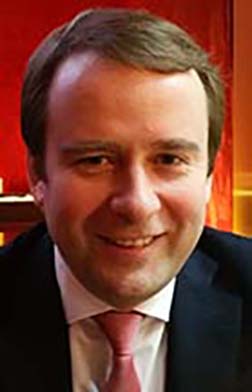
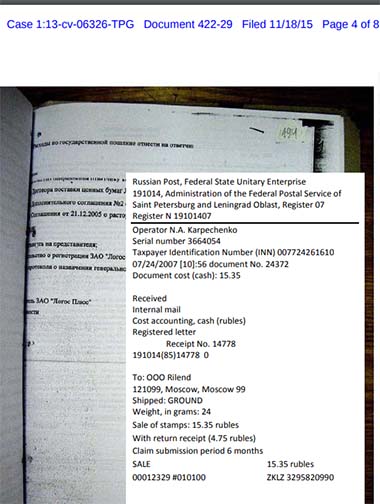
Great article, Bravo!
The Guardian has been an evidence free zone for many years now. The readership rarely read more than the first couple of sentences of any article. They just want the Guardian to give them a narrative ” steer ” . Cohen provides just that.